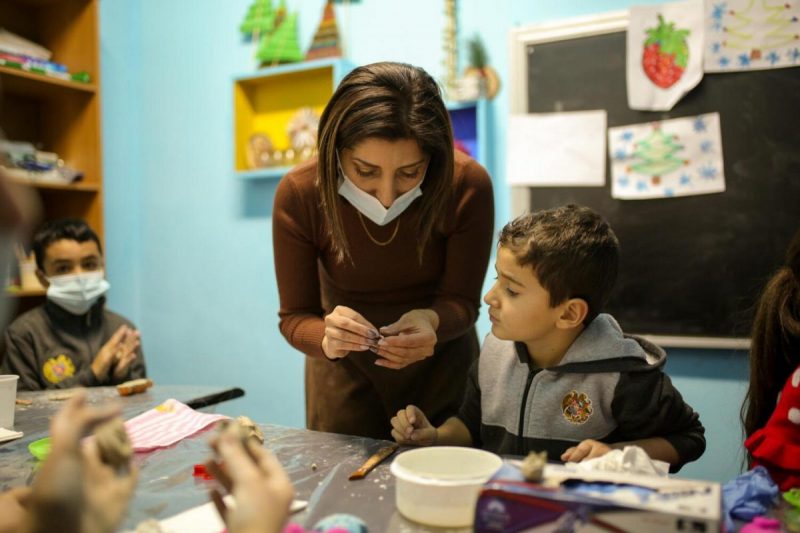
As schools reopen, it is important to prioritize and commit to taking care of your mental health and well-being – this helps you to have more positive energy for yourself, your students and their families. Here are 10 tips on how you can do it!
-
Set aside time to unwind
Think about what helps lift your mood and gets you through stress – whether it is playing with your children, going for a walk, talking to your friends, taking care of your plants, reading a book or cooking a new recipe. Keep some space to relax. These activities are as important as your working hours. It’s about allowing yourself to feel energized.
-
Plan ahead
As schools reopen, there could be a million things on your mind on how to engage with students and help them with the transition. Make a list of all your tasks and activities for the day or week early on. Use a day planner or notebook to plan your week. Set small goals and take appropriate breaks. It will help you plan your time better and alleviate the stress of having too many unplanned things to do.
-
Set boundaries
The COVID-19 pandemic has resulted in increased stress levels in the lives of many teachers with a new way of teaching, personal health and family issues. Whether you are teaching online or in the classroom, you are continually taking care of students’ needs throughout the day. Make sure to set boundaries to have ‘me’ time, be with family, or enjoy what you like to do. One easy way to create boundaries is by paying attention to how you feel during your daily activities and listening to cues that may tell you that something is not working for you. Have dedicated time in which you prepare for your teaching and other time when you are not. You may consider scheduling student help hours so you have dedicated time to support the students beyond the classroom time. Make sure the students and their parents/caregivers know the best time to contact you. Establish (and stick to) a window of time before bed that is “tech-free” – when you are making sure not to check emails and messages. You may also consider setting reminders to help you remember your boundaries. If you feel that others are not respecting these boundaries, think of ways that you can gently and respectfully have a conversation with them, sharing what you know about the importance of protecting one’s mental health and how your boundaries help you to do that.
-
Get vaccinated
Get vaccinated when it’s your turn. Getting vaccinated will protect you from severe COVID-19 infections, hospitalizations and death and can alleviate the safety concerns of being back in school. It will also protect your family, your students and their families. You will be required to keep taking precautions after vaccination, but feeling safer will definitely make you feel better!
-
Adjust your expectations
This is a period of adjustment for everyone and keeps things in perspective. You can only control certain things and circumstances during the transition period in your classroom. Don’t pressurize yourself to provide the same learning experiences as the pre-lockdown period. You are one single professional and doing your best to adapt to change. As we move on, the school community will learn and adapt.
-
Acquire new skills and appreciate the ones you already have
Teachers, across the globe, were largely unprepared to support the continuity of learning mostly because of limited digital skills. Acquiring and mastering new skills will help you in the professional journey and will provide greater confidence and comfort in work. You can sign up for online courses, virtual workshops, webinars, or watch videos to enhance your digital skills and adapt to alternative teaching methods. Remember to appreciate the skills that you already have. They can help you learn even more!
-
Be kind to yourself
If you are feeling overwhelmed, share your feelings with another teacher, friend or family member. Having a conversation with your supervisor or senior school leader will help them understand you and offer support. Remember, a healthy relationship will have a positive influence on the children you are teaching.
-
Stay socially connected
You can keep yourself physically apart to limit the spread of the virus, but it is important that you stay emotionally and socially connected with your friends, family and colleagues. Celebrate happy occasions over video calls, engage in virtual working groups or join online book clubs. When seeing others, prefer outdoor activities, and use masks when required by your local health authorities.
-
Get your body moving
Physical activity is proven to be a powerful fighter to navigate stress and anxiety. With regular exercise, you can feel more energetic throughout the day, sleep better at night, have sharper memories and feel more relaxed and positive about yourself. Even a short 10 minutes of brisk walking boosts our mood and can give an enormous sense of well-being. If you can’t go to the gym every day, play with your children or throw a dance party when you are done instruction for the day.
-
Seek mental health support if needed
Take care of your mental health and well-being and seek mental health support if you have signs of depression, anxiety, and burnout. Feeling tired and unhappy is not the same as being depressed. The major signs of depression, anxiety, burnout, and other mental health problems that need specialized mental health attention include fatigue and sleep problems, rapid heart rate and breathing, feeling of danger, changes in appetite and weight loss, hopelessness, persistent headaches and pain, and digestive problems that do not get better. These symptoms, if not treated, can prevent you from having a joyful and active life. Recognizing these signs and seeking medical or psychological support is the first step to helping you feel better and even preventing other serious medical conditions.